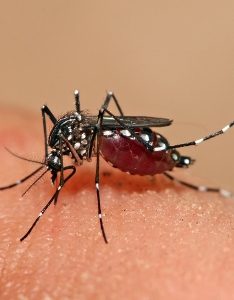First suspect chikungunya case emerges in Cayman
 (CNS): Public health officials sent a blood sample Wednesday to the Caribbean Public Health Agency (CARPHA) in Trinidad to test it for chikungunya after a patient who had travelled to countries where there is an outbreak of the virus went to the the local hospital with symptoms consistent with it. Medical Officer of Health, Dr Kiran Kumar said, “The CARPHA has been notified and we are advised that they will prioritise this case and will revert with the results as a matter of urgency. "While officials wait for the results, the MRCU said it is taking additional control measures in the area where the patient lives. The district where the patient is a resident has now been confirmed as George Town.
(CNS): Public health officials sent a blood sample Wednesday to the Caribbean Public Health Agency (CARPHA) in Trinidad to test it for chikungunya after a patient who had travelled to countries where there is an outbreak of the virus went to the the local hospital with symptoms consistent with it. Medical Officer of Health, Dr Kiran Kumar said, “The CARPHA has been notified and we are advised that they will prioritise this case and will revert with the results as a matter of urgency. "While officials wait for the results, the MRCU said it is taking additional control measures in the area where the patient lives. The district where the patient is a resident has now been confirmed as George Town.
“The government has been closely monitoring this situation as its incidence has increased across the region,” said Osbourne Bodden, the health minister. “I want to assure the public that the Department of Public Health and the Mosquito Research and Control Unit are working together to keep a close watch – and are increasing their vigilance and mosquito control efforts to minimise the population of the vector.”
As of 23 June, cases of chikungunya have been confirmed in 24 countries in the Caribbean.
The blood sample will also be tested for dengue and Dr Kumar encouraged everyone to take precautions regardless of the outcome of the test.
“Irrespective of confirmation or otherwise of this case as chikungunya or dengue, the public is being reminded to employ protective measures against mosquito bites locally or during their travels. Use mosquito repellents on skin and clothing, and when outdoors during times that mosquitoes are biting, wear long- sleeved shirts and long pants tucked into socks,” he advised.
While the MCRU are concentrating efforts to keep mosquito populations down in many cases the wider public can also help with simple precautions.
“People can greatly assist in reducing the local Aedes aegypti population by clearing their yards of containers that can hold water as these are favourite breeding sites for this mosquito,” MRCU Director Dr. William Petrie said.
As at 23 June,cases of chikungunya have been confirmed in 24 countries in the Caribbean.
For more advice on how to control mosquitoes in your yard, contact the MRCU on 949-2557 in Grand Cayman or 948-2223 in Cayman Brac; and DEH on 949-6696 in Grand Cayman or 948-2321 in Cayman Brac.
Key Facts on Chikungunya
- Chikungunya is a viral disease transmitted to humans by infected mosquitoes. It causes fever and severe joint pain. Other symptoms include muscle pain, headache, nausea, fatigue and rash.
- Thedisease shares some clinical signs with dengue, and can be misdiagnosed in areas where dengue is common.
- There is no cure for the disease. Treatment is focused on relieving the symptoms.
- The proximity of mosquito breeding sites to human habitation is a significant risk factor for chikungunya.
- Since 2004, chikungunya fever has reached epidemic proportions globally, with considerable morbidity and suffering.
- The disease occurs in Africa, Asia and the Indian subcontinent. In recent decades mosquito vectors of chikungunya have spread to Europe and the Americas. In 2007, disease transmission was reported for the first time in a localized outbreak in north-eastern Italy.
Category: Health


I think everyone should pay attention to this one…..
if we have a hurricane this season……. and a bunch of these disease carring insects breeding everywhere afterwards ….. its gonna be a big mess..
buy lots of repellent…. keep it in your hurricane prepare pack.
This virus travels via infected humans which are unlikely to blow in on the breeze.
So if there is no cure for the disease, does that mean if you are bitten that's it Kaput you are dead?????
CDC has good info. Quarantine is recommended. A high fever that usually resolves after 7 days, painful and debilitating joint swelling that can make moving around difficult and work impossible for several months or more. In some African victims the swelling has lasted years. Not fun.
Very few die from it; most eventually get better, though some have lingering pain.
You don't die you just have to deal with the syntoms that apparently could possibly last for years.
Yes, totally. You become a zombie and after a while of rampaging around eating brains you head falls off.
that's it… any mosquitoes I see is getting shot down! … eh … with holes in my roof!
Very unfortunate for victim, we hope they are safely quarantined now?
Why not give the district so residents of that district be even more cautious?
Because the sane among us are not that parochial.
I doubt it would take long for it to spead across the entire island.
Thank God the government cut the Mosquito Control budget by $74,000.00 as it gives me great confidence in their decision making abilities.
Clearly they are smarter than the general public.
Strange, I feel the same symptoms after dealing with anyone in CIG. This must be already endemic.
Watch out for the Chikkibunga everyone, snooze.
Pass de chilupa!